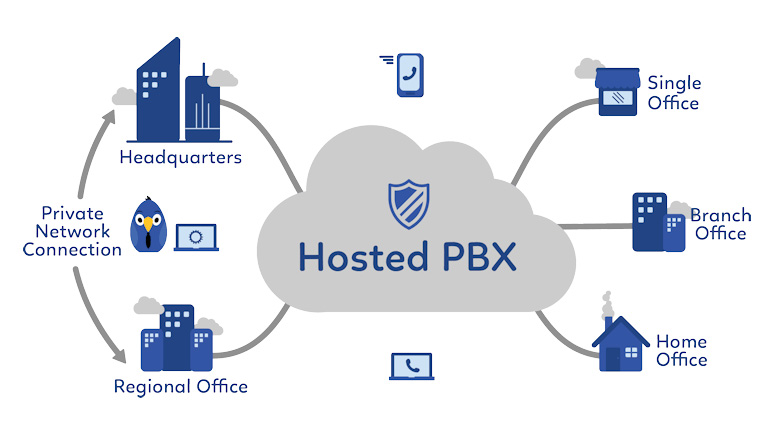Upgrading from traditional phone lines to VoIP (Voice over Internet Protocol) systems opens up a world of opportunities for businesses, providing them with advanced communication tools and revolutionary business phone systems. VoIP allows phone calls to be made using an internet connection, offering greater flexibility and lower costs compared to traditional landlines. With VoIP, voice is broken down into digital packets and sent as data over the internet, enabling businesses to make calls using multiple devices such as phones, computers, and smartphones. VoIP systems come equipped with a range of features, including virtual receptionists, automatic call forwarding, three-digit dialing, and voicemail to email.
VoIP systems offer numerous advantages for modern enterprises. They are cost-efficient, allowing businesses to save on long-distance and international calling charges. Additionally, VoIP systems offer better sound quality compared to traditional phone lines and come with enhanced functionality, such as the ability to hold conference calls, transfer calls easily, and integrate with other communication tools. VoIP systems are also compatible with the latest technologies, ensuring seamless integration with existing business software and applications. Furthermore, VoIP systems offer high reliability, minimizing the chances of dropped calls or disruptions in communication.
Key Takeaways:
- Upgrading to VoIP systems provides businesses with advanced communication tools and revolutionary phone systems.
- VoIP enables phone calls to be made using an internet connection, offering flexibility and cost savings.
- VoIP systems come with features such as virtual receptionists, automatic call forwarding, and voicemail to email.
- Advantages of VoIP include cost efficiency, better sound quality, improved functionality, compatibility with the latest technologies, and reliability.
- Businesses should evaluate their communication goals and choose the right system type (PBX, VoIP, or cloud-based) before upgrading their phone system.
Overall, upgrading to a VoIP system can greatly enhance communication, efficiency, and customer service for modern enterprises. The benefits of VoIP, including cost savings, improved functionality, and compatibility with the latest technologies, make it a compelling choice for businesses looking to unlock new possibilities and revolutionize their communication systems.
Understanding VoIP for Business: How It Works and What It Offers
VoIP for business, also known as IP telephony, revolutionizes communication by leveraging the power of the internet and offering a comprehensive suite of business communication tools. With VoIP, phone calls are made using an internet connection instead of traditional phone lines, enabling greater flexibility and cost savings for modern enterprises.
But how does VoIP work? Instead of transmitting voice signals over copper wires, VoIP breaks down voice into digital packets and sends them as data over the internet. These packets are then reassembled at the receiving end, allowing for seamless communication.
One of the key advantages of VoIP is its versatility across different devices. Whether it’s a desk phone, computer, or smartphone, VoIP can be used to make calls, send messages, and even hold virtual meetings. It offers a range of features to enhance business communication, from virtual receptionists and automatic call forwarding to three-digit dialing and voicemail-to-email integration.
To better understand the benefits of VoIP for business, let’s take a look at some of its key features and advantages:
- Low Cost: VoIP services are generally more cost-effective than traditional phone systems. The ability to make calls using an internet connection eliminates the need for separate phone lines, reducing monthly expenses.
- Improved Functionality: VoIP systems offer advanced features that enhance business communication, such as call recording, call analytics, and presence indicators that show whether a contact is available or busy.
- Better Sound Quality: With VoIP, voice signals are converted into digital data and transmitted over the internet, resulting in clear and high-quality audio. This ensures that each conversation is crisp and reliable.
- Compatibility with the Latest Technologies: VoIP systems seamlessly integrate with other business tools, such as customer relationship management (CRM) software and team collaboration platforms. This integration streamlines workflows and boosts productivity.
- Reliability: VoIP systems are designed to be reliable, with built-in redundancy measures to minimize downtime. Service providers often have backup systems and multiple data centers to ensure uninterrupted communication.
When considering the switch to VoIP, it’s important for businesses to evaluate their communication goals and assess their current phone system. This evaluation will help determine the most suitable system type – whether it’s a traditional PBX, a pure VoIP system, or a cloud-based solution.
Next, we will explore the different system types businesses can choose from and the benefits and considerations associated with each option.

VoIP systems present numerous advantages for modern enterprises, ranging from cost savings and advanced features to improved compatibility and reliable communication. With VoIP, businesses can significantly reduce their phone bills, as calls are transmitted over the internet rather than traditional phone lines. This eliminates the need for separate phone systems and costly long-distance charges. VoIP also offers competitive pricing plans and international calling options, making it an attractive choice for businesses with global operations.
One of the key advantages of VoIP is the array of advanced features it offers. VoIP systems provide businesses with a range of communication tools, including virtual receptionists, automatic call forwarding, three-digit dialing, and voicemail to email transcription. These features enhance productivity and professionalism, allowing for seamless and efficient communication within the organization and with clients or customers.
Compatibility with the latest technologies is another significant benefit of VoIP systems. As technology continues to evolve, businesses need to stay up-to-date to remain competitive. VoIP systems integrate easily with other software applications and platforms, enabling businesses to streamline their operations and enhance collaboration. Additionally, VoIP systems are compatible with various devices, including phones, computers, and smartphones, providing flexibility and accessibility to users.
| Advantages of VoIP Systems |
|---|
| Cost savings on phone bills |
| Advanced features for efficient communication |
| Compatibility with the latest technologies |
| Reliable communication |
VoIP systems unlock new possibilities for modern enterprises, revolutionizing the way businesses communicate and collaborate. The benefits of VoIP, such as cost savings, advanced features, compatibility with the latest technologies, and reliable communication, make it a compelling choice for businesses of all sizes. By upgrading to a VoIP system, businesses can enjoy enhanced productivity, increased efficiency, and improved customer service, ultimately gaining a competitive advantage in the market.
Factors to Consider Before Upgrading to VoIP: Evaluating Your Business Communication Goals
Before making the leap to VoIP for your business phone system, it’s crucial to evaluate your communication goals and ensure that VoIP aligns with your specific requirements. VoIP offers a wide range of features and benefits, but it’s important to consider how these align with your business objectives.
Start by assessing your current communication system and identifying any pain points or limitations. Are you experiencing frequent dropped calls or poor sound quality? Do you have limited scalability or flexibility with your current system? Understanding your current challenges will help you determine which features of VoIP would be most beneficial for your business.
Next, consider your future growth plans. Will your business expand to multiple locations? Do you anticipate an increase in remote work or mobile workforce? VoIP systems are highly scalable and can easily accommodate these changes. With features like virtual receptionists and automatic call forwarding, you can ensure seamless communication regardless of your business’s size or geographical spread.
Business phone systems have evolved significantly over the years, and VoIP offers a modern and flexible solution for companies of all sizes.
It’s also important to think about the specific needs of your industry. For example, if you’re in the customer service or sales industry, features like call recording or three-digit dialing may be essential. On the other hand, if you prioritize cost savings and budget control, VoIP systems typically offer lower monthly fees and reduced long-distance charges compared to traditional phone lines.
Finally, evaluate your internet connectivity and reliability. VoIP relies on a stable internet connection, so it’s essential to ensure that your network can support the increased bandwidth requirements. Consider options like dedicated internet connections or Quality of Service (QoS) routers to prioritize voice traffic and minimize latency or jitter issues.
By carefully evaluating your communication goals and aligning them with the features and capabilities of VoIP systems, you can make an informed decision about upgrading your business phone system. Whether you choose PBX, VoIP, or cloud-based systems, upgrading to VoIP can improve communication, efficiency, and customer service for modern enterprises.

“VoIP offers a wide range of features and benefits, but it’s important to consider how these align with your business objectives.”
- Assess your current communication system and identify pain points
- Consider future growth plans and scalability needs
- Think about industry-specific requirements and features
- Evaluate internet connectivity and reliability
Choosing the Right System Type: PBX, VoIP, or Cloud-Based
Selecting the right system type is essential when upgrading to VoIP for your business phone system, and understanding the differences between PBX, VoIP, and cloud-based telephony is crucial. Each system type offers unique advantages and considerations that can impact your communication needs and overall business operations.
Let’s start by exploring PBX phone systems. PBX, or Private Branch Exchange, systems have long been a popular choice for businesses. They provide cost-effectiveness, scalability, and advanced features such as call routing and automated attendants. PBX systems are easily integrated with existing infrastructure and can improve customer service by enabling features like call forwarding and voicemail to email. However, it’s important to note that PBX systems require a substantial initial investment, as they typically involve on-site hardware installation and maintenance. Additionally, PBX systems often rely on internet connectivity, so a stable and reliable internet connection is essential.
On the other hand, VoIP phone systems offer cost efficiency, advanced features, and scalability. With VoIP, phone calls are made using an internet connection, allowing for lower costs and greater flexibility compared to traditional landlines. VoIP systems can be used on multiple devices, including phones, computers, and smartphones, providing seamless communication across different platforms. However, it’s important to consider some potential drawbacks of VoIP systems. They are dependent on a reliable internet connection and may experience latency and jitter issues that can affect call quality. Security concerns are also important to address when implementing a VoIP system for your business.
Cloud-based phone systems, which are a type of VoIP, offer additional benefits such as scalability, flexibility, and enhanced features. With cloud-based telephony, your phone system is hosted in the cloud, eliminating the need for on-site hardware and allowing for easy remote accessibility. Cloud-based systems offer cost savings by eliminating the need for expensive infrastructure installations and simplifying maintenance. These systems can be scaled up or down as your business needs change, and they provide advanced features like virtual receptionists and call analytics. Cloud-based telephony is considered the future of business communication, offering a modern and efficient solution for enterprises.
As you consider upgrading your business phone system to VoIP, take the time to evaluate your communication goals and needs. Consider factors such as cost, functionality, scalability, and reliability. Assess your current system and determine which system type will best align with your business objectives. Whether you choose PBX, VoIP, or cloud-based telephony, upgrading to a VoIP system can significantly improve communication, efficiency, and customer service for your modern enterprise.

PBX phone systems offer a range of benefits for businesses, including cost-effectiveness, scalability, advanced features, and enhanced customer service, but they also require careful consideration due to potential investment and connectivity requirements.
One of the major advantages of PBX phone systems is their cost-effectiveness. These systems eliminate the need for multiple phone lines and allow businesses to make and receive calls over their existing internet connection, resulting in significant cost savings on telephone bills. Additionally, PBX systems often come equipped with advanced features such as call forwarding, voicemail, and virtual receptionists, enhancing communication capabilities and improving overall efficiency.
Scalability is another key benefit of PBX phone systems. As businesses grow and expand, these systems can easily accommodate additional phone lines and extensions, making them a flexible and future-proof communication solution. Whether a company has 10 employees or 100, a PBX system can scale to meet their changing needs without requiring a complete overhaul.
However, it is important to carefully consider certain factors before implementing a PBX phone system. Firstly, businesses must be prepared for the initial investment required to set up the infrastructure and install the necessary equipment. Additionally, PBX systems rely heavily on internet connectivity, so a stable and reliable internet connection is crucial to ensure uninterrupted communication. Regular maintenance and updates may also be necessary to keep the system running smoothly.
| Benefits of PBX Phone Systems | Considerations of PBX Phone Systems |
|---|---|
| Cost-effectiveness | Initial investment |
| Scalability | Internet connectivity |
| Advanced features | Maintenance requirements |
| Enhanced customer service |
In conclusion, PBX phone systems offer numerous benefits for businesses, providing cost savings, scalability, advanced features, and improved customer service. However, the investment and connectivity requirements should be carefully considered before implementing a PBX system. By weighing the pros and cons, businesses can make an informed decision and choose the right phone system that aligns with their communication goals.

VoIP phone systems offer businesses cost efficiency, scalability, significant cost savings, and advanced features, but it’s crucial to consider factors such as internet connectivity dependability and potential latency and jitter issues. With VoIP, businesses can save on long-distance and international call charges, as calls are transmitted over the internet rather than traditional phone lines. This can lead to substantial cost savings, especially for businesses with high call volumes or international operations.
Scalability is another key advantage of VoIP phone systems. Traditional phone lines require physical infrastructure and hardware installation, which can be time-consuming and expensive to expand or modify. In contrast, VoIP systems can easily scale up or down to accommodate business growth or changing needs. Adding new phone lines or expanding the system to multiple locations can be done with minimal disruption and cost.
When considering VoIP systems, businesses should be aware of potential issues related to internet connectivity. A stable and reliable internet connection is essential for uninterrupted phone service. Factors such as bandwidth availability, network congestion, and router quality can affect call quality and reliability. Additionally, VoIP systems may experience latency and jitter issues, which can cause delays or disruptions during calls. It’s important to assess the internet infrastructure and ensure it can support the demands of VoIP before implementation.
| Advantages of VoIP Phone Systems | Considerations for VoIP Phone Systems |
|---|---|
|
|
In conclusion, VoIP phone systems offer modern enterprises numerous benefits, including cost efficiency, scalability, significant cost savings, and advanced features. However, businesses should carefully evaluate their internet connectivity reliability and potential latency and jitter issues before implementing VoIP. By considering these factors and choosing a reliable service provider, businesses can leverage the advantages of VoIP systems to enhance their communication capabilities, streamline operations, and improve customer experiences.
Cloud-Based Phone Systems: The Future of Business Communication
Cloud-based phone systems, a revolutionary form of VoIP, provide businesses with unmatched scalability, an array of enhanced features, significant cost savings, and simplified maintenance, making them the future of business communication. With cloud-based telephony, businesses can leverage the power of the internet to streamline their communication infrastructure and unlock new possibilities.
One of the key advantages of cloud-based phone systems is scalability. Unlike traditional phone systems that require physical hardware installations and can be difficult to scale, cloud-based systems offer virtually limitless expansion capabilities. Whether your business is growing rapidly or you need to downsize, a cloud-based VoIP solution can easily accommodate your changing needs, allowing you to add or remove phone lines as required.
In addition to scalability, cloud-based phone systems offer enhanced features that can elevate your business communication. Features like auto-attendants, call recording, voicemail to email, and conferencing capabilities empower your team to collaborate effectively and efficiently. These advanced features not only improve internal communication but also enhance customer interactions, boosting overall customer satisfaction and loyalty.
| Advantages of Cloud-Based Phone Systems | Considerations |
|---|---|
| Scalability | Dependence on a reliable internet connection |
| Enhanced Features | Latency and jitter issues |
| Cost Savings | Security concerns |
| Simplified Maintenance |
When it comes to cost savings, cloud-based phone systems offer significant advantages. By eliminating the need for expensive on-site hardware and maintenance, businesses can reduce their upfront and operational costs. Additionally, cloud-based systems often operate on a subscription-based model, allowing businesses to pay for only the services they need, further optimizing their communication budget.
Lastly, the simplified maintenance of cloud-based phone systems saves businesses time and resources. With all maintenance and updates handled by the service provider, businesses can focus on their core operations without the need for dedicated IT personnel. This frees up valuable resources and ensures that your communication system is always up to date with the latest features and security enhancements.
In conclusion, cloud-based phone systems offer businesses unparalleled scalability, advanced features, significant cost savings, and simplified maintenance. As the future of business communication, adopting a cloud-based VoIP solution can provide your enterprise with the flexibility, efficiency, and competitive edge needed to thrive in today’s digital landscape.
Conclusion
Upgrading to a VoIP system opens up a world of possibilities for modern enterprises, offering advanced communication tools, cost savings, scalability, and enhanced customer service capabilities. The flexibility and functionality of VoIP systems empower businesses to thrive in the digital age.
VoIP, or Voice over Internet Protocol, allows phone calls to be made using an internet connection, providing greater flexibility and lower costs compared to traditional landlines. By breaking up voice into digital packets and sending them as data over the internet, VoIP enables businesses to make calls using multiple devices, including phones, computers, and smartphones.
VoIP systems offer a range of features that can enhance business communication. Virtual receptionists, automatic call forwarding, three-digit dialing, and voicemail to email are just a few examples of the advanced tools that VoIP systems provide. These features can streamline workflows, improve customer service, and increase efficiency.
Furthermore, VoIP systems offer a host of advantages for modern enterprises. They are cost-effective, allowing businesses to save on phone bills and eliminate the need for separate landlines. VoIP systems can be accessed from anywhere with an internet connection, enabling remote work and flexible communication. The sound quality of VoIP calls is often superior to traditional phone lines, ensuring clear and reliable communication.
Additionally, VoIP systems are compatible with the latest technologies and can easily integrate with other business tools and software. This enables businesses to leverage the full potential of unified communications, integrating voice, video, messaging, and collaboration into a seamless communication experience.
While there are considerations to keep in mind, such as the need for a reliable internet connection and potential security concerns, the benefits of upgrading to a VoIP system far outweigh the drawbacks. For businesses evaluating their communication goals and looking to improve their phone systems, VoIP offers a modern and efficient solution that can revolutionize the way they communicate and operate.
By embracing VoIP technology, businesses can unlock a range of possibilities and propel themselves into the future of communication. With advanced features, cost savings, scalability, and enhanced customer service capabilities, VoIP systems enable modern enterprises to stay competitive and thrive in today’s digital landscape.
FAQ
Q: What is VoIP?
A: VoIP stands for Voice over Internet Protocol. It is a technology that allows phone calls to be made using an internet connection instead of traditional landlines.
Q: How does VoIP work?
A: VoIP works by breaking up voice into digital packets and sending them as data over the internet. These packets are then reassembled at the receiving end to reproduce the voice.
Q: What devices can I use with VoIP?
A: VoIP can be used on multiple devices, including phones, computers, and smartphones. As long as you have an internet connection, you can make and receive calls using VoIP.
Q: What features do VoIP systems offer?
A: VoIP systems offer various features, such as virtual receptionists, automatic call forwarding, three-digit dialing, and voicemail to email. These features enhance productivity and streamline communication.
Q: What are the advantages of VoIP systems?
A: VoIP systems offer several advantages, including low cost, connection anywhere, better sound quality, improved functionality, compatibility with the latest technologies, and reliability.
Q: Are there any limitations or considerations with VoIP systems?
A: While VoIP systems offer numerous benefits, it’s important to note that they may not be suitable for emergency calls and require a reliable internet connection. Businesses should consider these factors before upgrading.
Q: How should businesses choose the right system type?
A: Businesses should evaluate their communication goals and consider the features and capabilities offered by different system types, such as PBX, VoIP, or cloud-based, before making a decision.
Q: What are the benefits and considerations of PBX phone systems?
A: PBX phone systems provide cost-effectiveness, scalability, advanced features, easy integration, and improved customer service. However, they may require a substantial initial investment, depend on internet connection, and require regular maintenance.
Q: What are the benefits and considerations of VoIP phone systems?
A: VoIP phone systems offer cost efficiency, advanced features, scalability, and cost savings. However, they depend on internet connection, may experience latency and jitter issues, and have security concerns.
Q: What are the benefits of cloud-based phone systems?
A: Cloud-based phone systems, a type of VoIP, provide benefits such as scalability, flexibility, remote accessibility, enhanced features, cost savings, and simplified maintenance. They are considered the future of business communication.



